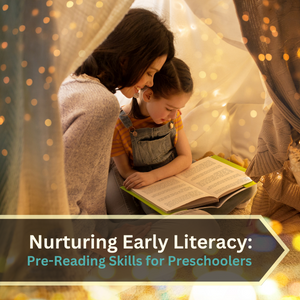Understanding Pre-Reading Skills: What Are They and Why Are They Important?
Before children can embark on the exciting journey of reading and writing, they need to develop a set of foundational skills known as pre-reading skills. These skills are the building blocks of literacy and play a crucial role in a child’s ability to learn to read and write successfully.
Defining Pre-Reading Skills and Their Significance in Early Literacy Development
Pre-reading skills include phonological awareness, letter knowledge, print awareness, oral language, and comprehension. These skills enable preschoolers to understand and interact with the written word long before they can read and write. They are critical in preparing young minds for the more complex tasks of decoding and comprehending text.
How These Skills Lay the Foundation for Future Reading and Writing Success
Developing solid pre-reading skills in preschool sets the stage for future academic achievement. These skills help children understand how language works, an essential aspect of literacy. They also contribute to a child’s ability to think critically, solve problems, and understand complex concepts later in life.
The Top 5 Pre-Reading Skills Every Preschooler Should Develop
In the realm of early literacy, specific pre-reading skills are particularly crucial for preschoolers. These skills form the foundation for all future reading and writing abilities.
An Overview of the Main Pre-Reading Skills

- Phonological Awareness: This involves recognizing and manipulating individual sounds in words – a crucial part of learning how to read. It includes skills like rhyming, alliteration, and identifying syllables.
- Letter Knowledge: Reading readiness involves understanding that each letter has a name and corresponds to specific sounds, which is integral for preschoolers learning to read.
- Print Awareness: Recognizing print in the environment and understanding how books work (e.g., text directionality).
- Oral Language: The ability to express thoughts, emotions, and ideas effectively through spoken language.
- Comprehension: Understanding and deriving meaning from stories and information.
Why Each of These Skills Is Crucial for Preschoolers
Each of these pre-reading skills contributes to a child’s overall literacy development. Phonological awareness and letter knowledge, for instance, are foundational to phonics, which is essential for reading. Print awareness introduces children to the purpose and function of written language, while oral language skills are closely tied to reading comprehension and vocabulary development. Comprehension, the ability to understand and interpret stories, is the ultimate goal of reading.
Phonological Awareness: Playing with Sounds in Words
Phonological awareness is a fun and engaging area of learning for preschoolers, as it involves playing with the sounds in words.
Exploring Phonological Awareness: Understanding and Manipulating Sounds
This skill is all about the auditory aspect of language. It’s not about the letters on the page but the sounds in spoken words. Activities that enhance phonological awareness don’t require any reading or writing. Instead, they focus on listening and manipulating sounds.
Activities to Enhance Phonological Awareness
Simple games and activities can significantly boost a child’s phonological awareness. Rhyming games, where children identify words that sound alike, are a great start. Clapping out syllables in words is another effective method. Songs, poems, and chants that emphasize rhyme and rhythm are also excellent tools for developing this skill.
Developing Letter Knowledge: Recognizing and Understanding the Alphabet
A crucial step in pre-reading skill development is helping preschoolers become familiar with the alphabet and understand that each letter represents specific sounds.
The Importance of Letter Knowledge in Pre-Reading Development
Letter knowledge is the foundation of phonics, the ability to connect sounds with letters. It involves recognizing letters visually, knowing their names, and understanding the sounds they represent. Identifying individual sounds in words is a critical skill for decoding words during reading.
Fun Ways to Teach Letter Recognition and Sounds
Incorporating letter learning into everyday activities makes it an enjoyable experience for preschoolers. Alphabet crafts, such as creating collages or painting letters, help reinforce letter shapes and names. Alphabet games and puzzles can also be fun ways to practice letter recognition. Engaging children in activities where they can trace or form letters with their fingers, in sand, or with playdough helps solidify their understanding of each letter’s shape and sound.
Print Awareness: Navigating the Written World
Print awareness is a critical pre-reading skill that helps preschoolers understand the function and significance of printed text in their environment.
Introducing Print Awareness: Understanding How Print Works
Print awareness includes recognizing print in various forms—books, signs, labels—and understanding how print is used. It involves knowing that print carries meaning, recognizing text directionality (left-to-right, top-to-bottom), and identifying parts of a book (front, back, title page).
Activities That Promote Print Awareness
Fostering print awareness can be as simple as reading aloud to children and pointing out words as you read. Encourage preschoolers to handle books, turn pages, and talk about the pictures. Labeling items around the home or classroom with their names is one of the activities for preschoolers that helps children connect words with objects, enhancing their reading readiness. Interactive storybook apps and eBooks can also enhance print awareness, as they often highlight text as the story is read.
Oral Language Skills: Building a Foundation for Reading and Writing
Oral language skills are the bedrock of literacy development, providing the vocabulary and sentence structure knowledge necessary for reading and writing.
The Role of Oral Language in Pre-Reading Skill Development
Developing oral language skills involves enriching a child’s vocabulary and ability to use language effectively. It’s about helping them express their thoughts and understand others, which is crucial for later reading comprehension and narrative skills.
Encouraging Oral Language Growth
Encourage preschoolers to express themselves through storytelling, conversation, and role-play. Engage them in discussions about their day, their feelings, and their interests. Listening to stories and participating in interactive read-aloud sessions where you ask open-ended questions can also significantly enhance oral language skills.
Comprehension: Understanding and Connecting with Stories
Comprehension, the ability to understand and derive meaning from stories and texts, is an essential component of reading skills for successful reading.
Developing Comprehension Skills in Preschoolers
By engaging in activities for preschoolers, even before children can read, they can start developing comprehension skills. This involves understanding the plot of a story, recognizing characters, and making connections between the story and their own experiences, all being essential reading skills kids need to develop.
Tips for Improving Comprehension
Ask preschoolers about the stories you read together to encourage them to consider the content. Discuss the characters’ actions and motivations, and relate the story to the child’s life or other stories they know. Use picture books to help them interpret and discuss the illustrations, which can provide context and deepen understanding.
Fun and Effective Activities for Enhancing Pre-Reading Skills in Preschoolers
Creative and engaging activities can help preschoolers develop essential pre-reading skills.
Here are some of our family favorites for helping our children be encouraged to read.
- Learning Resources Pop for Letters, Early Phonics Game: This engaging game enhances alphabet recognition, early phonics and literacy skills in children four and up. It includes eight pop cards featuring colorful letters and is suitable for preschoolers and kindergarteners. Players pop the bubble to reveal a letter and practice phonics through fun, interactive play. Ideal for both home and classroom settings, “Pop for Letters” makes learning ABCs exciting and enjoyable.
- Word Pop CVC Words Games by The Fidget Game: “Word Pop CVC Words Games” is an innovative, multisensory board game aimed at helping children in Pre-K to 1st grade learn to read quickly and effectively. Developed by The Fidget Game, it focuses on consonant-vowel-consonant (CVC) words, blending phonics with reading in a fun and interactive way, aiding the child in reading and comprehending better. This educational game engages children with its playful fidget elements, making it an excellent tool for early readers.
- Coogam Sight Words Game with 400 Fry Sight Words and 4 Fly Swatters Set: The Coogam Sight Words Game is an exciting and educational tool for teaching literacy and phonics to kids aged 3 to 5. It includes 400 cards featuring Fry sight words and four colorful fly swatters. This game encourages children to identify quickly and swat sight words, enhancing their reading and comprehension skills. It’s perfect for homeschooling, kindergarten classrooms, and fun learning at home, providing a dynamic way for kids to master essential sight words.
Activities Tailored to Develop Pre-Reading Skills
Incorporate activities that involve rhyming, matching letters with sounds, and recognizing common words in the environment. Games that involve sorting objects by the first letter, making alphabet books, and singing alphabet songs are also beneficial. Use everyday moments, like grocery shopping or walks in the park, as opportunities for learning new words and talking about the world around them.
Incorporating Activities into Everyday Routines and Play
The key is to make these activities a natural and enjoyable part of daily life. When you turn learning into play, you’ll find that children are more engaged and retain information better. Whether through storytelling, arts and crafts, or interactive games, there are countless ways to weave pre-reading skills into everyday experiences.
Supporting Struggling Readers: Tips for Parents and Teachers
Not all children develop pre-reading skills at the same pace, and some may need additional support.
Identifying and Assisting Preschoolers with Difficulties Learning Pre-Reading Skills
Be attentive to signs that a child may struggle, such as difficulty rhyming words or recognizing letters. Early intervention can make a significant difference in their literacy journey.
Strategies for Providing Additional Support and Encouragement
Use multi-sensory approaches to teaching, such as tactile activities that involve touch or movement-based games. Break down reading and writing skills into smaller, more manageable steps, and celebrate progress, no matter how small. Most importantly, ensure that learning remains fun and stress-free.
Fostering a Love of Reading Early: Engaging Young Minds
Instilling a love for reading from an early age is perhaps the most crucial aspect of pre-reading skill development.
Creating a Positive Reading Environment at Home and in the Classroom
Surround preschoolers with books and reading materials that are accessible and appealing. Create cozy reading nooks and regularly visit libraries or bookstores. Model a love of reading by sharing your favorite books and discussing them.
Encouraging a Lifelong Love of Reading Through Engaging and Enjoyable Experiences
Acquire reading skills a regular and enjoyable part of your child’s routine. Participate in story times, book clubs for young children, or reading challenges. Please encourage them to choose their books and explore different genres and topics.
Reflections:
Developing pre-reading skills in preschoolers is a journey filled with exploration, discovery, and fun. Focusing on phonological awareness, letter knowledge, print awareness, oral language, comprehension, and fundamental literacy skills can set a solid foundation for your child’s future academic success. Remember, the goal is not only to prepare them for reading and writing but to foster a lifelong love of learning and a passion for the written word.
Are you ready to embark on this exciting journey of fostering pre-reading skills in your preschooler? Join us at Happy Pages Homeschool for more insights, resources, and support in nurturing your child’s early literacy development!




